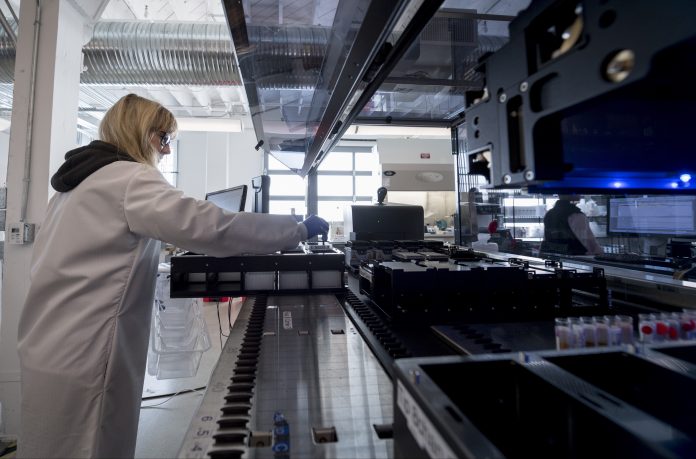
Among the challenges long faced by diagnostics developers striving to broaden the use of their tests is finding enough patients to generate enough samples, especially for rare or inherited disorders, as well as finding ways of getting paid for that testing.
Invitae launched its own solution to those challenges in July, when it announced it is offering, without charge to patients, its Detect genetic testing programs for four conditions: muscular dystrophy, hereditary prostate cancer (stage II and above), familial cardiomyopathy and arrhythmia, and lysosomal storage diseases (LSDs). The free testing is being offered for conditions where testing is underused, with the goal of leading to earlier diagnosis and treatment, Invitae said.

“Our mission is to really help bring genetics into mainstream medicine, and one of the ways that we’re doing that is by breaking down barriers that patients have to getting the testing, and the answers that they need to make actionable health decisions,” Katherine Stueland, chief commercial officer, Invitae, told Clinical OMICs.
The Detect programs also offer participants genetic counseling after their testing. Some programs also offer follow-up testing to family members of patients with genetic variants associated with disease.
The cost of testing will be underwritten by sponsors. Invitae is among a relatively small subset of diagnostics developers focused on sponsored testing programs. Other developers include Prevention Genetics, Ambry Genetics (part of Konica Minolta), Emory Genetics Laboratory (part of Eurofins), and Perkin Elmer.
“They’re recognizing that they have testing capabilities, and that there’s more to their opportunities than just simply providing clinical services,” said Charles Mathews, principal with ClearView Healthcare Partners, a global strategy consulting firm serving the life sciences sector. “They can provide services to pharma companies that are trying to look for new and innovative ways of identifying and diagnosing patients.

“Invitae is really working hard to perfect this from a commercial perspective,” Mathews added.
During a presentation at the Biomarkers and Diagnostics for Complex and Rare Disease Summit, held June 19-20 in Boston, Mathews identified three considerations in the design of genetic testing programs: identifying the right test technology, motivating physicians to adopt testing, and mitigating cost concerns. To achieve success, the tests must align the interests of drug developers, diagnostics developers, and payers with biopharmas particularly active in developing such programs.
Partnerships with diagnostics developers have emerged as a solution for pharma companies meeting resistance from payers buying into the value of testing. For many conditions, the yield of potential patients who can benefit is low, requiring the testing of up to thousands of patients.
Mathews identified three barriers to testing: yield, reimbursement, and technical challenges in assay design and execution. Technical challenges have prompted pharmas to pursue two-stage testing—having the phenotypic marker, and being able to reflex the genotype, for example. The diagnostic developer launches an initial blood screen with a biochemical marker, then sends for further genetic confirmation of those who screen positive for the marker.
Looking for Partners
“The commercial challenge is, ‘I have a product for a rare or orphan disease. But how do I find anybody that can benefit from it?’” Mathews explained. “Many pharma companies are looking for diagnostic partners with good ideas about how to identify different ways of getting more people tested, in the hopes that they find more people that respond to the therapy.”
Across its various tests, Invitae has 47 partners with which it has programs currently under way. Partners include primarily biopharma companies, as well as advocacy groups. For the four Detect programs, one drug developer partner had emerged at deadline, Neurogene for the LSDs. This program offers testing through an up-to-53 gene panel—48 primary genes, and add-on genes CHIT1 for chitotriosidase deficiency, ATP13A2 for preliminary-evidence, and three genes for adult-onset neuronal ceroid lipofuscinoses (CTSF, DNAJC5, and GRN).
Neurogene is developing a treatment for aspartylglucosaminuria (AGU), a rare neurodegenerative LSD where patients experience some form of developmental delay. The company is enrolling patients in a natural history study of AGU, and is planning IND-enabling studies toward a first-in-human clinical trial.

Invitae’s Detect Muscular Dystrophy program offers testing with one of four options: A dystrophinopathies test designed to identify pathogenic variants in the DMD gene; an up-to-34 gene limb-girdle muscular dystrophy panel; an up-to-56 gene comprehensive muscular dystrophy panel; and an up-to-123 gene comprehensive panel designed to identify inherited neuromuscular disorders, including muscular dystrophies, myopathies, and congenital myasthenic syndromes.
“Obtaining genetic testing can be challenging due to multiple factors—including cost of testing and awareness of testing and why it is critical. At MDA we appreciate all efforts to help remove barriers to genetic testing and can help make such testing available for many who may otherwise not have access to this essential information,” said Kristin Stephenson, EVP, chief advocacy and care services officer for MDA, which is not a sponsor of Invitae Detect.
Invitae has developed an up-to-19-gene prostate cancer panel; and an up-to-150-gene arrhythmia and cardiomyopathy comprehensive panel. Stueland said the company is considering expanding Detect into other conditions, based on the need and utility for testing, and the amount of investment and new clinical research by biopharmas.
Outside of the Detect program, Stueland said, Invitae’s patient pay price per testing for the vast majority of its testing menu is $250. For insurance companies, it usually ranges between $850 and $1,000. For conditions largely covered by insurance companies, patients would only pay a minimal out-of-pocket fee of roughly $100.
During his presentation, Mathews recommended a “call to action” for pharmas to move away from one-off, disease-by-disease relationships with diagnostics developers in favor of a more comprehensive testing paradigm akin to newborn screening, using genomic-based screening protocols.
“There’s a tipping point I anticipate will occur here,” Mathews said, “where if you have enough conditions with therapeutic options, and a method that can accurately and economically look at all of them, then it makes sense to do more of a broad screen, as opposed to what we’re seeing now, which is the one-off individual programs testing for specific conditions for specific therapeutics.”











